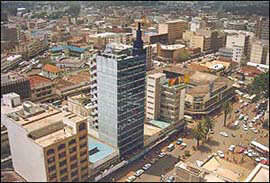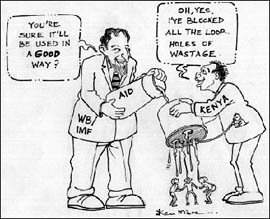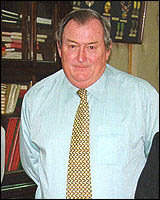 INTERNATIONAL AID AND REFORMS INTERNATIONAL AID AND REFORMS |

Kenya has been treated quite harshly by the international donor community favoring its neighbors, Tanzania and Uganda, which have continued receiving aid. The country did not collapse though - as might have happened in other countries with weaker and less diversified economies - but its economic performance has been hampered. The World Bank and the IMF prompted the Kenyan government to undertake a series of structural reforms in order restore their aid programs and financial support. Three conditions had to be met prior to that: economic changes, political reform, and political governance. The first two conditions have been accomplished at varying degrees of success. In 1992 the economy was liberalized. Since then, interest rates have been reduced, price controls and import licenses have been eliminated, subsidies removed, and a number of parastatal companies have been sold in an unprecedented privatization process that is still going on. There have been some criticism regarding the slow pace of divestiture of state owned strategic companies, but it has to be admitted that the effort has been done, and that the process is still unfinished.

The second condition imposed, political reform, took the shape of multiparty elections. These have not been deprived of controversy. The first multiparty elections in Kenya - held in 1992 - as well as the second ballot in 1997, were won by the ruling party KANU (Kenya African National Union), headed by President Moi. However both elections were marred by clashes in the Coast and in the Rift Valley among followers of the different parties and ethnic groups. The 1997 clashes near Mombasa scared tourists away, affecting the performance of tourism in such a negative way that the sector has been unable to recover until very recently. Even though the opposition cried out fowl play by KANU, the fact is that the ruling party came out weakened, losing majority in the unicameral Parliament, proving that the poll was fairer than expected. President Moi is supposed to step down by the year 2002, when the next elections will take place. That will be the real showdown, since Moi has not yet designated his political dauphin, and the opposition is so utterly broken down that unless they unify they do not stand a chance.
Finally there is the issue of political governance.
This issue seemed to be the hardest one to tackle.
But for the past few months things seem to have
been moving in the right direction. Determined to
get the stamp of approval of the international community
and the Bretton Wood institutions, President Moi
appointed in July 1999 a new Head
of the Civil Service. Dr. Richard Leaky, an
internationally reputed paleoanthropologist well
known for his expeditious manners and excellent
results as the former director of the Kenya Wildlife
Service, was instructed to undertake the arduous
and dangerous task of reestablishing the credibility
of the Government. Dr. Leaky, a Caucasian Kenyan
with no tribal ties or obligations, apparently has
been given carte blanche from the President to restore
order in the ranks of the civil servants through
shuffling, hacking, and firing. |
So far, the mastermind of Kenya's Recovery Strategy has downsized ministries from 27 to 15 in an attempt to reduce public expenditure and rationalize resources. Ministers have been reshuffled and inefficient top civil servants have been sacked and substituted by well known private sector technocrats and businessmen. Even parastatal boards and companies have not escaped the axe. The former directors of the Kenyan Tourist Board, Kenyan Ports Authority, Tea Trade Development Authority and the highly corrupted Coffee Board of Kenya have been forced to step down being substituted by highly capable individuals. And the dance has just started. Sweeping changes seem to be looming in the horizon.
 Dr Lesky: from wildservice to a wilder service economy Dr Lesky: from wildservice to a wilder service economy |

Dr. Leaky insists that "the fight against corruption is primarily been driven by the demand of the Kenyan people", and it just happens to coincide with the conditions set by the Bretton Woods institutions. "An ease up of the IMF would signal an open door to a lot of financial assistance and investment. It is a stamp of confidence that we need to obtain", adds the Head of Kenya Civil Service. But the IMF and the World Bank have not given in yet. Discussions are still going on between the Kenyan government and the Bretton Wood institutions but, for the time being, the WB seems to be waiting for these reforms to settle. According to Mr. Harold Wackman, Country Director for Kenya for the World Bank, there has been an unfortunate game between the international donor institutions and the governments of developing nations. "We tell them what to do, and when they get the funds they do not do all of it, then we withhold the money. We have concluded that we have to wait until we make sure things are done properly". However, The World Bank has not paralyzed those projects that were already in place when aid was ceased. "Other aid programs, including ESAF, were suspended in 1997, further deteriorating the state of the economy by depriving Kenya of program aid, balance of payment support and budget support assistance resources, since by convention these cannot be made available to a developing country without an IMF program in place" argues Hon, Masakhalia, the present Minister of Energy and previous Minister of Economy. He goes further: "an economy starved of resource inadequacy is inevitably plunged into economic recession"
The fact remains that despite the alleged corruption, Kenya continues to be an island of peace and stability in East Africa, and given its paramount geo-strategic position, Kenya should not be allowed to go down. Just a quick look at its immediate neighbors says it all. Kenya is entangled in war with Eritrea; the Democratic Republic of Congo (ex-Zaire) is fighting rebel forces within its territory in a civil war that has already drawn in Uganda and Rwanda; Burundi is still healing from its brutal holocaust - as so is Rwanda; Sudan and Somalia are no-man lands, raided and drained by bloodthirsty warlords. "Kenya is the most secure and stable country in this region of Africa" claims Professor Saitoti, Kenya's Vice-president. |

